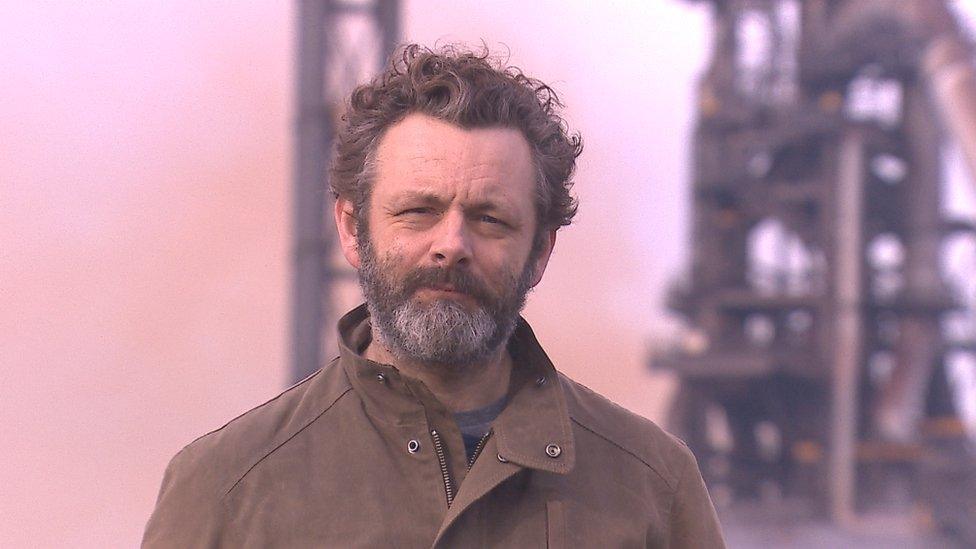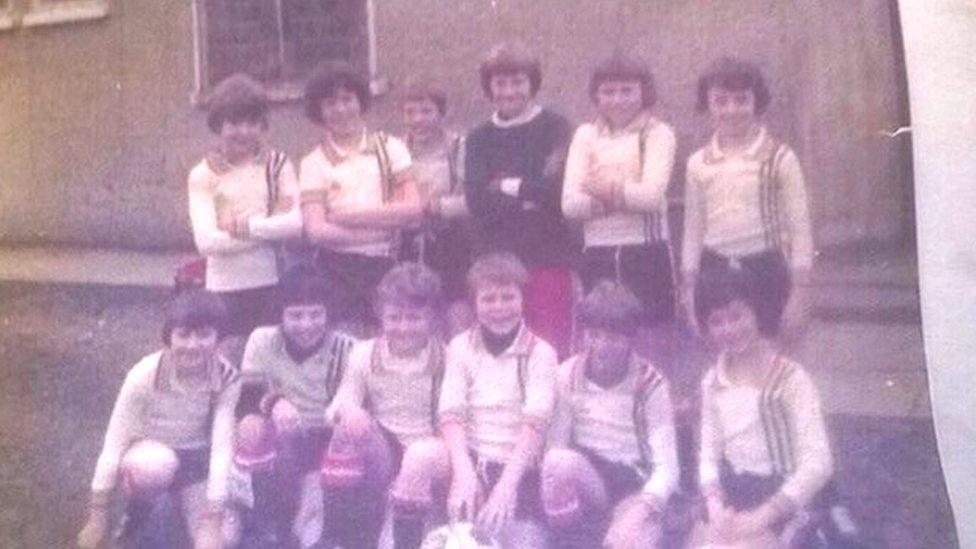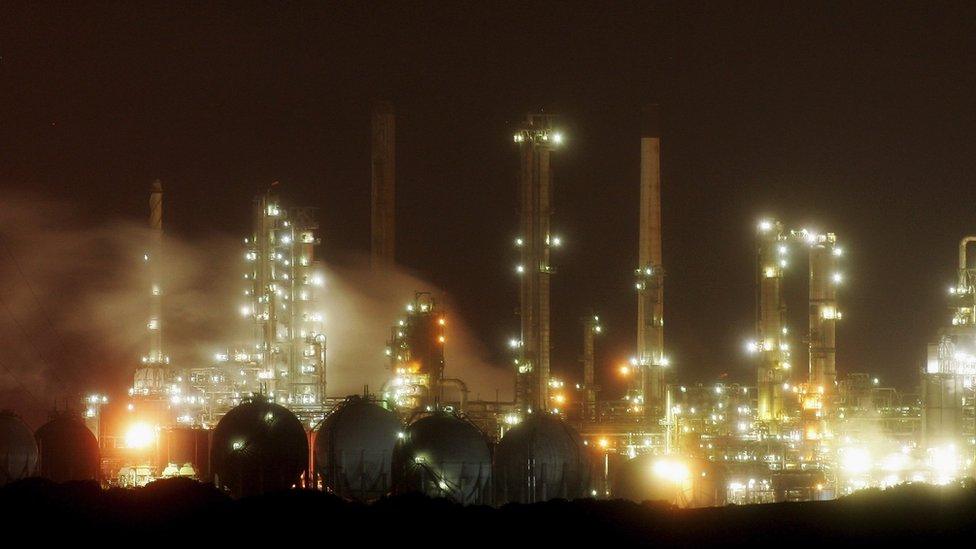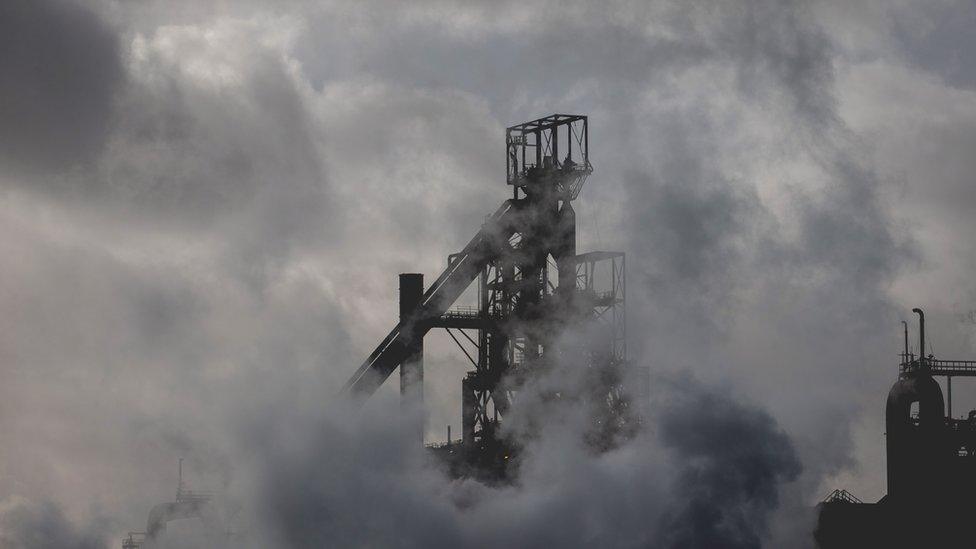Michael Sheen's return to Port Talbot to fight for steel town
- Published

Michael Sheen was born in Newport but his parents moved to Port Talbot where he honed his acting skills in local amateur dramatics productions
Hollywood film star Michael Sheen returns to Port Talbot to present a BBC Wales Week In Week Out documentary on the the threatened steel works, the life blood of his home town.
At the beginning of the year Indian owners Tata announced 750 job losses. Two months later, the company put its UK business up for sale.

Growing up in Port Talbot, the steelworks played a huge part in actor Michael Sheen's life.
As a boy, Sheen would play football in the shadow of the plant. And he admits it could be a frightening place describing it as "dark and malevolent, like this sort of monster sitting there down by the sea".
But after dark it took on a different persona.
"At night time it was a comfort of a place," he said.
"You could see if from the hills and the mountains. All the lights, the flames. It's like the North Star for the town - so many families' lives revolve around its axis.

Michael Sheen (top right) with the Baglan Boys Football Club - the actor was offered a place on Arsenal FC's youth team but it would have meant his family relocating
"It's a complicated relationship; it was frightening, it was comforting; it put food on families' tables; but it also exacted a high price at times."
As a child, Sheen even believed that clouds were made in the massive steelworks, from the smoke and steam which "billows out from the chimneys and stacks".
His mother, Irene, worked there as a junior secretary in the early 1960s; his father Meyrick was employed by an engineering firm which did work on the site.
Now living in Hollywood, Sheen returned to Port Talbot for a BBC documentary he is presenting.
Hollywood actor Michael Sheen on growing up within the shadow of Port Talbot steelworks
At the beginning of this year, the plant's owners Tata announced there would be 750 jobs losses.
Then, two months later, the company announced it had put its UK business up for sale.
Over the course of five months, he has followed the stories of people in the town who are affected by the decisions.
He met workers who have lost their jobs, businesses who fear for their future and families whose lives have been turned upside down.
In the programme, Sheen said: "One thing is for sure, the future of this town and this community is completely tied up with what happens to this steelworks.

"Not just economically, but in terms of this town's identity. Who this town is, who these people are."
Sheen, 47, had never been inside the steelworks before and was impressed to see Welsh steel being made close up.
"I've grown up in the town and had a relationship with the steelworks at a distance," he said.
"So to be actually inside is like being in the heart of the town and everything I have come to find beautiful; which is the beauty of heavy industry - I have been right inside the heart of it today and it's like being in the most beautiful place I've ever been.
"And the other thing is, walking around and meeting the people working in here you can tell there is a real sense of massive pride and a real sense of family.
"You get a real sense of camaraderie and the fierce pride in what they are doing. It's been an overwhelming experience really to be here."
Port Talbot steelworks employs 4,100 people and, together with the rest of its UK business, has been put up for sale by Tata.

Sheen insists Port Talbot must not be allowed to be "abandoned" as he says the south Wales valleys were after the decline of mining
The sale was prompted by reported losses of up to £1m a day.
Seven bidders have come forward to say they would be interested in buying the business, although there has been speculation recently that Tata could keep the steelworks as those massive losses have been reduced.
Whatever the future holds, Sheen said there needed to be a plan for the town.
"We've seen in the valley communities here, in the de-industrialised post-mining era, that the communities have just been left, they feel abandoned, they feel forgotten.
"We can't let that happen to this town.
"There has to be an alternative, no matter what happens to the steelworks, there has to be some kind of safety net for these people and this community because if it can happen here - a place that has been the heart of the British industry for so long - then it could happen anywhere."
'Michael Sheen: The fight for my steel town',BBC1 Wales at 20:00 BST on Wednesday, 8 June, and on the BBC iPlayer here.